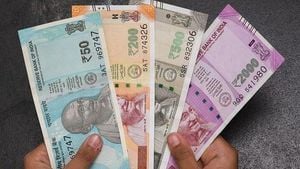The 3rd Panel of the Superior Court of Justice (STJ) in Brazil has confirmed the legality of fully seizing Income Tax refunds, a decision that has significant implications for debtors across the nation. This ruling came after an appeal from a debtor who argued that such a seizure would jeopardize their subsistence. However, the STJ determined that this measure is permissible when there is no threat to the debtor's ability to maintain a basic standard of living.
The case originated from the Court of Justice of the Federal District (TJDFT), which interpreted that the amounts refunded from Income Tax (IR) can come from various sources, not just salaries. The debtor failed to demonstrate that the seizure would cause harm to their dignity or that of their family. Minister Moura Ribeiro, the rapporteur for the case at the STJ, upheld the TJDFT's decision while reviewing the debtor's appeal.
In his ruling, Ribeiro emphasized the court's established jurisprudence that allows for the seizure of funds categorized as "food" as long as a sufficient portion is reserved to ensure the dignity of the debtor and their dependents. Importantly, the STJ underscored that the Income Tax refund is not exempt from seizure, provided that the minimum necessary for the debtor's maintenance is safeguarded.
The panel reached a unanimous decision, noting that there was no evidence indicating that the total seizure would endanger the debtor's subsistence. The court clarified that any analysis of the evidence to assess the impact of the seizure is not within the STJ's purview, as established by Summary 7 of the court's guidelines. Thus, the prevailing understanding is that Income Tax refunds are not automatically protected against seizure, especially in the absence of concrete proof of real damage presented by the debtor.
This ruling has stirred conversations about the broader implications for taxpayers and their rights. The decision highlights a critical intersection between tax law and debtor protections, raising questions about how much of a taxpayer's refund can be claimed by creditors.
On another note, as taxpayers prepare for the 2025 Income Tax season, there are opportunities to maximize refunds by filing carefully and taking advantage of legal deductions. Individuals who earned taxable income exceeding R$ 33,888 in 2024 are required to file their taxes by the looming deadline of May 30, 2025. The Brazilian IRS anticipates receiving approximately 46.2 million tax declarations this year.
The refund process essentially serves as an adjustment between what individuals have paid in taxes throughout the year and what they should have paid based on their actual income and deductible expenses. The greater the number of deductible expenses a taxpayer can substantiate, the smaller their taxable income will be, thus increasing the potential refund amount.
Taxpayers should be aware that there are eight specific strategies outlined by the Federal Revenue Service that can lead to an increase in their Income Tax refunds. Among the most significant deductible expenses are medical consultations, exams, hospitalizations, health plans, and medical treatments. Notably, there is no limit on the amount that can be claimed for these expenses, provided they are properly documented with receipts.
Additionally, taxpayers can declare educational expenses for their dependents, with a maximum deduction of R$ 3,561.50 per person for monthly fees at educational institutions ranging from early childhood to higher education. However, expenses related to language courses, tutoring, or materials are not eligible for this deduction.
For those contributing to a PGBL (Private Pension Plan), there is an opportunity to deduct up to 12% of their annual taxable income, provided they utilize the complete declaration model. This deduction is particularly advantageous for individuals looking to lower their tax liability while potentially increasing their refunds.
Moreover, donations made to approved funds for children and adolescents, elderly care, and government-sanctioned cultural or sports projects can also be deducted from taxable income, up to 6%. These donations not only support important causes but can also enhance the taxpayer's refund or reduce their tax burden.
Taxpayers seeking to navigate the complexities of the Income Tax filing process can benefit from the "Guide do Imposto de Renda 2025" (Income Tax Guide 2025). This comprehensive resource provides detailed explanations of the various strategies and common pitfalls to avoid when preparing tax returns. It is designed to help taxpayers declare their income confidently, minimize errors, and identify opportunities for maximizing refunds.
Every year, a specialized journalist prepares a step-by-step guide to assist readers in their tax preparations, and this year is no exception. The 2025 guide offers updated information, accessible language, and a strong focus on helping taxpayers save time and money. This guide is available for free and can be accessed easily via mobile or computer, serving as a valuable tool for individuals looking to file their taxes without complications.
In summary, as Brazilian taxpayers gear up for the 2025 Income Tax season, the recent ruling by the STJ regarding the seizure of refunds underscores the importance of understanding both taxpayer rights and the potential for maximizing returns through careful filing practices. With the right knowledge and resources, individuals can navigate this process effectively and potentially see a significant refund in their accounts.




